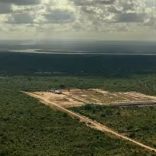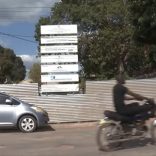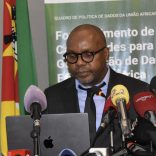Mozambique: World Bank to disburse further 50 million dollars for Maputo Urban Project
Mozambique: New aid package within next two years, says MCC

Photo: O País
The Millennium Challenge Corporation (MCC) of the United States expects to finalise a second package of development aid for Mozambique within the next two years.
Speaking to reporters in Maputo on Friday, after an audience granted by President Filipe Nyusi, the MCC Chief Executive Officer, Sean Cairncross, said the MCC will work with the Mozambican government, in accordance with projects to be presented over the next two years, to identify the main constraints hindering the development of the economy.
The aid packages granted by the MCC, known as “compacts”, normally cover a period of five years, and are intended to reduce poverty through sustainable economic growth.
Asked about the sums to be granted to Mozambique, Cairncross said this would depend on the projects submitted. He believed the next two years would be crucial for the country to design sustainable projects.
He said that, on average, an MCC compact covers aid worth between 350 and 500 million dollars. He warned that, for Mozambique to be eligible, the government should start immediately on preparatory actions.
For his part, the Minister of Economy and Finance, Adriano Maleiane, said the government is ready to draw up the projects within the deadline laid down by the MCC. To ensure that the projects are drawn up effectively and dynamically, he added, the government has appointed the former Minister of Agriculture, Higino de Marrule, as the national coordinator of the Mozambican team
“We have a kind of consultative committee”, said Maleiane. “From our side, we have already been prepared for a long time”. He believed that all the conditions are in place so that, as soon as the funds are received, they will be used in the duly selected places.
The first MCC compact was signed in 2007 and ran for five years. It was a grant of 506.9 million dollars, of which only 447.9 million (88 per cent) was spent.
The largest component was a water and sanitation project budgeted at 203.6 million dollars intended to improve access to safe, reliable water supplies and sanitation services. According to the MCC’s own summary of the first compact, project teams constructed more than 614 rural water points (boreholes with hand pumps), upgraded and expanded two municipal drainage systems, and two urban water supply systems.
But although the median household year-round trip time to the primary water source fell by 62 minutes and dry-season roundtrip time fell by 129 minutes, the MCC admits that this project had “no statistically significant impact” on health-related outcomes, household income or the poverty rate.
Road building and rehabilitation was to have taken 176.3 million dollars of the compact (although only 136.8 million dollars was actually spent). The target was to rehabilitate 491 kilometres on key stretches of the main north-south highway (EN1), but this target was eventually cut back to 253 kilometres. The work was not completed until December 2014, well after the end of the compact.
39 million dollars was earmarked for a land tenure services project and 17.4 million dollars to a farmer income support project.
The key aim of the latter project was to improve the productivity of coconut farmers in the central province of Zambezia by removing palm trees affected by lethal yellowing disease. MCC claims that more than 780,000 disease-resistant seedlings were planted and more than 15,000 farmers were trained in coconut pest and disease surveillance and control.
In the areas worst hit by the disease, the project “had a measurable and significant impact on households’ adoption of alternative crops”, but MCC admits that “the magnitude of the increase was small and did not result in an impact on household income”.
The delay in completing some of the projects in the first compact meant that Mozambique did not become immediately eligible for a second contract. The MCC now claims that the first compact was brought to a successful conclusion in September 2013, and that “a new compact would build on the country’s continued commitment to sector reform and MCC’s strong relationship with the country”.
The MCC is an agency of the United States government, which was set up by the US Congress in 2004. It is intended to be an independent agency that is not run either by the State Department or by the US Agency for International Development (USAID).
Productive day in Maputo! Thank you President @FNyusi & US Ambassador Hearne @USEmbassyMaputo 🤝🇺🇸🇰🇪 This visit marks the start of a new partnership btwn the US + the Government of #Mozambique through @MCCgov—excited for what we will achieve together for the people of #Mozambique pic.twitter.com/ZdjS5TRl5H
— Sean Cairncross (@MCC_CEO) January 24, 2020
Asante, Kenya for your generous hospitality! A productive visit. Excited about this new partnership & Kenya’s strong commitment to the @MCCgov scorecard criteria—looking forward to working side by side to deliver reforms & real results for all Kenyans 🇺🇸🇰🇪 Next stop #Mozambique! pic.twitter.com/dSyTUMm6q6
— Sean Cairncross (@MCC_CEO) January 23, 2020












Leave a Reply
Be the First to Comment!
You must be logged in to post a comment.
You must be logged in to post a comment.